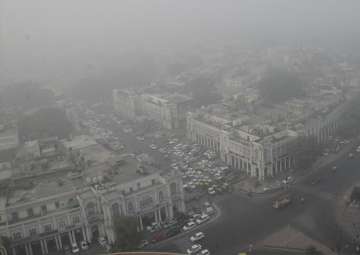NGT says Odd-Even plan a 'farce' and can't be imposed, questions rationale behind Kejriwal Govt's decision
The NGT termed Odd-Even scheme a "farce" and asked the Delhi government to give an undertaking that it will roll out the scheme only when the PM 2.5 was over 300.

Uncertainty prevailed over the implementation of the odd-even car rationing scheme as the National Green Tribunal (NGT) on Friday questioned the rationale behind Delhi government's decision to roll it out for five days next week, saying the scheme "cannot be imposed like this".
The NGT questioned the basis for the AAP government's decision pointing out that the Central Pollution Control Board (CPCB) and Delhi Pollution Control Committee (DPCC) have found that the levels of PM10 and PM2.5 were cumulatively higher when the scheme was implemented twice earlier.
"Odd-Even formula can't be imposed like this. You can't have a shock treatment like this. By this scheme, you are only encouraging people to buy more vehicles and allowing more inter-state traffic. We will not allow odd-even vehicle rationalisation scheme until you prove that it's not counter-productive," the bench said.
The NGT termed the plan a "farce" and asked the Delhi government to give an undertaking that it will roll out the scheme only when the particulate matter (PM) 2.5 was over 300.
"You are getting the tag of the worst capital in the world. The SC and NGT have suggested 100 measures to curb pollution, but you always opt for odd-even. Nothing has been done by the Delhi government in the past one year," a bench headed by NGT Chairperson Justice Swatanter Kumar said.
It also quizzed the city government over its decision to introduce 500 buses during the odd-even week and directed it to clearly state how many of these vehicles ran on diesel.
The prevailing level of PM2.5 in the capital was hovering around 433 microgrames per cubic metre, while PM10 stood at around 617, as per the latest CPCB data.
Also Read: 5 reasons why Kejriwal's road-rationing policy may not rid Delhi of killer smog
The bench also directed the city government to submit the comparative ratio of emission caused by diesel and petrol vehicles and asked it to clearly enumerate the contribution of small petrol cars in pollution.
It also questioned the justification of exempting two-wheelers and women drivers during the odd-even scheme despite knowing that two-wheelers caused 46 per cent pollution, as per an IIT Kanpur report.
"We don't want to stop your programme. It is indeed a laudable project taken in the interest of the environment.
But the manner in which it is being implemented is unscientific and inefficient," it said.
Following a plea by the AAP government, the green panel however allowed the industries engaged in essential services to operate in the Delhi-NCR on the condition that they would not pollute and cause emissions.
The hearing remained inconclusive and will continue on Saturday.
During the hearing, the Delhi government counsel told the bench that they were introducing the odd-even scheme in pursuance to the directions of the apex court-appointed EPCA.
But the tribunal rapped him over this submission and said the Environment Pollution Control Authority (EPCA) had issued several suggestions and odd-even scheme was just one of them.
"The Supreme Court has never said that you implement the odd-even scheme. It was only one of the directions given by EPCA. You have not followed 99 directions and introduced the odd-even scheme and treating it as a picnic," the bench said.
"If the recommendation of Graded Response Action Plan were being followed (which requires that upon the parameter reaching 500 for PM10 and 300 for PM2.5 odd-even will be implemented), which were the days in the last three months when the pollution levels were found to be below the said limit and odd-even was not implemented," the bench asked.
The panel directed the Delhi government to be ready with all the answers and said it would hear the matter tomorrow, which is normally a holiday for NGT. The AAP government had yesterday announced introduction of the odd-even scheme as part of a Graded Response Plan to tackle the alarming pollution levels in the capital.
The city has been experiencing 'severe' air quality and has been reeling under a blanket of thick haze, as pollution levels breached permissible standards by multiple times.
With deadly smog blanketing Delhi and the neighbouring states, the NGT had yesterday banned construction and industrial activities and entry of trucks. The CPCB has recorded 'severe' air quality, meaning that the intensity of pollution was extreme.